Out of the Mental Health Care System
In what ways have you found psychiatric medication(s) harmful, if any?
My personality was completely altered, I lost self-control, I was extremely emotionally vulnerable and suggestible, I was hyper-vigilant, easily panicked, I constantly felt death was near (no surprise, given that the medication was bad for my organs), I felt extremely suicidal, I became risk-seeking, compulsive, obsessive-compulsive, hyperactive, my mind constantly raced so that I couldn’t concentrate, focus, retain information, my short-term memory was wiped-out, I blacked-out a lot, I was high all the time, dissociated all the time, I felt nauseated all the time, I lost my appetite and barely ate, I had insomnia, nightmares, night sweats, very disturbing waking visions, I was irresistibly drawn to danger, I enjoyed putting my life at risk and felt addicted to it, I felt no empathy, I felt rage, I was afraid of people, I felt like I was on a roller-coaster and I could never get off, because I believed what I had been told that I had to stay on the drugs or I would be a danger to myself or society.
During your mental health care, have you often felt hopeful about your chance of getting better?
No. I was always told, by every doctor or therapist I ever saw, that I would have to be on medication for the rest of my life, or I would be permanently institutionalized, with the exception of one doctor, who told me I could get off the drugs, but it would mean a life on the fringes of society, and the impression I was given was that I would be sick and out of control. I was given the impression that I would never again be a contributing member of society; I would always be on the fringes.
If you overcame hopelessness that you could get better from a mental health or emotional problem, was there a turning point for you?
I had always been told that I couldn’t get off the medications or I’d end up institutionalized. I was told it was dangerous to quit the medications. But I quit cold-turkey, and ended-up in the hospital. When I got out, I told my doctor I would never take those medications again, so he prescribed something different. In time, I dared to ask what would happen if I stopped taking those medications. I learned that quitting cold-turkey wouldn’t have the same effect as the other drug. I learned that I actually could quit this new drug cold-turkey, without suffering a psychotic break or a relapse or other effect. So I quit, and I’ve never willingly taken a drug since then. When I quit taking the drugs, I also quit seeing the doctors and therapists. I just read self-help psychology books what were, unbeknownst to me, triggering my PTSD. Even though I was constantly being triggered, I was gaining an understanding of the traumas that lead to my breakdowns. I had a will to learn what happened to me, and that kept me going. My hope was only to understand what happened. The turning point happened when I stumbled upon Dr. Peter Breggin’s book, about Toxic Psychiatry, and some passages struck a chord. I felt a great distaste for the book, because it meant facing the fact that I had been terribly abused by psychiatry, and I had lost everything I worked for and cherished because of unnecessary psychiatric drugging and institutionalization and abuse. I realized I had always been surrounded by predatory psychopaths and sociopaths, and I learned those people had made me sick with chronic fear and stress. The more I learned about the pathology of the abusers, and the devastating impact they have on their targets, the more I realized the problem never was within me: the problem was the abusers. If anyone should be locked-up and drugged, it’s them. My feelings improved more still when I found voices of peers and activists that echoed my own sentiments. I felt better still when I went to peer-run support groups for survivors of psychiatry and child abuse. And better still when I stood-up to the control freaks and bullies in these groups. And better still when I stood-up to the control freaks and bullies in other contexts.
Tell us what recovery means to you. How would you define recovery from mental health or emotional problems in your own words?
To be able to live my life free of the abuse of racism and sexism would be healing.
If you could send a brief message to someone receiving mental health care today who is feeling hopeless about getting better, what would you say?
Life gets better when the drugs are out of your system, and when you are out of the mental health care system. Drugging and psychiatry are powerful tools for social control and mind control, designed to keep people sick and weak, and to keep the profits flowing to pharmaceutical companies and the medical industry. Political and corporate powers are fascists, and they want you to be mentally, emotionally, spiritually, and physically sick so they can control you and make money off you. Go to www.educate-yourself.org.

